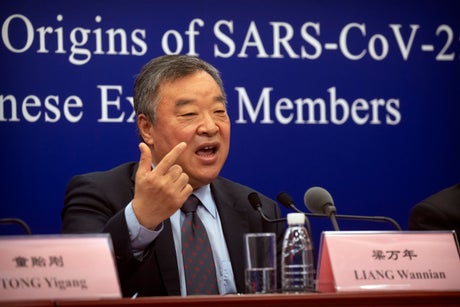
Chinese health officials pushed Wednesday to expand the search for the origins of the coronavirus beyond China one day after the release of a closely watched World Health Organization report on the issue.
They also rejected criticism that China did not give enough data to a WHO team of international experts that visited Wuhan the Chinese city where the first cases were detected, earlier this year.
The search for the origins of the virus has become a diplomatic feud. The U.S. and other Western nations have repeatedly raised questions about delays, transparency and data access, while China has promoted theories that suggest the virus may have come from elsewhere.
“If we limit the study of origin within China, I think this is a scientific misunderstanding, because the source is still unclear," said Liang Wannian, the head of the Chinese team that worked with the WHO group of experts.
He said the experts agreed that the place where the first case was identified is not necessarily where the virus emerged. “Based on this scientific consensus, we should have a broader viewpoint in terms of sourcing,” he said.
Experts agree that the virus could have come from elsewhere, with neighboring countries in Southeast Asia a prime possibility, but China's insistence on broadening the research seems partly politically motivated in the face of Western criticism.
The WHO report concluded that the virus or a progenitor of it was most likely carried by a bat, which infected another animal that infected a human. Researchers have not been able to trace the bat or the intermediate animal yet, but suspicion has fallen on bat habitats in southwest China or nearby Southeast Asia.
Bats carrying a virus similar to the one that causes COVID-19 have been found in China's Yunnan province, but Chinese experts noted that such viruses have also been identified in Southeast Asia. The same applies to pangolins, another mammal that is considered a possible carrier.
“Therefore, we feel that it is necessary to conduct the study of virus source under a global framework,” said Tong Yigang, the animal and environment group leader on the Chinese team.
Liang called accusations that China did not share data “invalid.” He said it's difficult to imagine the experts examining every sample and record, and that instead they used a database to perform analyses.
"On this issue, what our Chinese experts can see is the same as what the foreign experts can see,” he said.
Dominic Dwyer, an Australian expert on the WHO team, said although it can be argued they should have been allowed to visit Wuhan earlier, the team got “very good cooperation” from their Chinese colleagues.
“Yes, there are more things that perhaps we might have been given," he told the Australian broadcaster ABC “But in general terms they gave us a lot of data that the world hasn’t seen before and we were able to analyze that."
Japan's government spokesperson, Chief Cabinet Secretary Katsunobu Kato, echoed concerns expressed by the U.S. government, the European Union and others.
“We are concerned that this investigation faced delays and the lack of access to virus samples," he said Wednesday. He called for a “prompt, independent and expert-led investigation that is free of surveillance.”
Even the terminology has become a source of contention, with China and the WHO saying they are conducting joint research, not an investigation.







